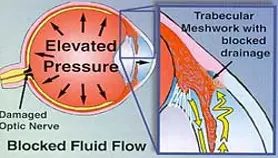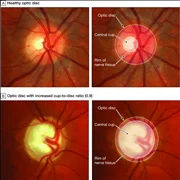Types of Glaucoma
POAG: Characteristics
- Most common type of glaucoma
- Bilateral but not always symmetric
- Adult onset
- Open, normal-appearing anterior chamber angles
POAG: Progression
- Asymptomatic in early stages
- Often marked visual loss has occurred when patient presents with vision symptoms
- Can result in blindness

POAG: Clinical Picture
History:
- ✦ Positive family history
- ✦ African American

POAG: Clinical Picture
Onset: 50+ years of age
Symptoms
- Usually none
- May have loss of central and peripheral vision late
Signs
-
Elevated IOP
-
Visual field loss
-
Glaucomatous disk changes
See after how diagnose glaucomatous changes
Remember: most patients with open angle glaucoma have no symptoms. This is the best reason to have periodic eye examinations with pressure checks and optic nerve evaluations.
Screening for POAG =
- IOP measurements +
- Optic disc evaluation +
- Visual field testing
POAG: Goal of Treatment
- Stop further visual loss
- Stop further optic nerve damage
 See after how treat glaucomatous changes
See after how treat glaucomatous changes